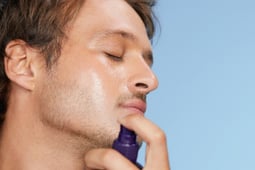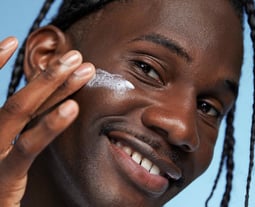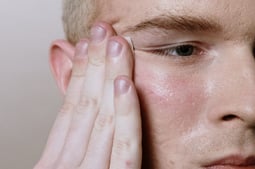

Should you moisturise your skin if you suffer from acne?
Photos D.R.
Words Anthony Vincent
Translated by Sébastien de Turenne
Share the article on
Oily skin with imperfections need moisturising as much as any other skin type.
People who have oily skin, which is also prone to imperfections generally (and mistakenly) avoid using moisturisers on their face for fear of making things worse. However, this widely spread belief is a misconception. Skin can appear oily due to excess sebum production. This dilates pores, thereby creating a fertile environment for spots and blackheads to thrive. A suitable moisturiser will help regulate this excess sebum production to balance out the skin.
Clean first, moisturise second
Successful moisturising requires good skin cleansing first, which will remove excess sebum and impurities. While oily skin might offer more resistance to external aggressions, this doesn’t mean you should use a strong cleanser. Strong cleansers attack the skin, which will produce even more sebum as a means to protect itself. If you can, choose a gentle product, which will preserve your acid mantle and prevent any overreaction from your skin. Skin drama: avoided.
Some ingredients are particularly useful when it comes to acne-prone skins, such as binchotan, a Japanese activated charcoal, which purifies the skin, and zinc PCA, an antibacterial mineral which effectively eliminates excess sebum. When combined, they sanitise the skin and any existing spots, while also preventing any new outbreaks. These active ingredients – ideal for skins with imperfections – are gathered in our purifying cleanser, which will prepare your skin for the next step in your skincare routine.
Moisturise and mattify at the same time
Once cleansed, acne-prone skin can be moisturised with a suitable product. The idea is to provide the skin with what it needs to stay moisturised, thereby reducing excessive sebum production and the dilated pores and spots it leads to.
This virtuous circle starts with moisturising agents such as plant-derived oils, provitamin B5, or even shea butter. On top of these ingredients, a good moisturiser should also contain long-lasting mattifying agents such as silica, an absorbent mineral. Our mattifying moisturiser contains all the above ingredients to moisturise acne-prone skins and prevent them from shining. Discrete and effective, as all double agents should be.
In short, skins with imperfections require more care to produce less sebum and fewer spots. For once, more is less.










